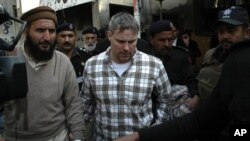Pakistan has reiterated that the fate of a detained U.S. diplomat facing double murder charges will be determined by the country's courts. The United States is demanding the immediate release of the diplomat, saying the man is being held "unlawfully."
Pakistani authorities have identified the U.S. diplomat as Raymond Davis. He was arrested in the eastern Pakistani city of Lahore last Thursday shortly after he shot and killed two armed men.
The American citizen has told a Pakistani judge he acted in "self-defense" because the men, who were riding on a motorbike, tried to attack him when he stopped at a busy traffic signal in the city.
While not naming the diplomat, the U.S. Embassy has sought his immediate release, saying he has immunity under international agreements to which Pakistan is also a signatory.
But the provincial high court chief justice, Ijaz Ahmed Chaudhry, Tuesday barred the government from handing over the American to U.S. authorities. The judge said the issue of whether the diplomat has immunity from prosecution will be decided by a Pakistani court.
The Pakistani government is a close ally of the United States but is coming under intense pressure from local media, opposition politicians and even parliamentarians from the ruling coalition not to release the U.S. diplomat.
The issue dominated proceedings in the national parliament on Tuesday. Both opposition lawmakers and members of the ruling Pakistan People’s Party spoke against releasing the U.S. diplomat. The ruling party’s senior leader, Raza Rabbani, told the Senate said that "diplomatic immunity allowing foreigners to gun down Pakistani citizens is unacceptable."
"Pakistan is an independent country," said Rabbani. "We have our own laws and we will not allow the citizens of Pakistan to be gunned down by any foreigner on the streets of Pakistan."
Both Pakistani President Asif Ali Zardari and Prime Minister Yousuf Raza Gilani have repeatedly stated that they are waiting for the results of the investigation into incident, but that the country's judicial process will determine the diplomat’s fate.
Critics say that the issue involving the arrest of the U.S. diplomat has put both the Pakistani government and the United States in an uneasy situation. Analysts like professor Hasan-Askari Rizvi say that if the government releases the American national it will come under more pressure from both Islamic and right-wing political parties in the country. But he says the United States is also facing a difficult situation.
"Over last one year, the American government was trying to improve its image at the popular level. It was undertaking a lot of programs for welfare of the common people [in Pakistan]," said Rizvi. "Now this effort will also be adversely affected by this controversy about the person. And if somehow America is able to get this person out of Pakistan, then I think the whole American effort to win goodwill at the common person level will be totally undermined."
U.S. officials in Islamabad insist the detained American is a member of the embassy's technical and administrative staff, with a full diplomatic status that provides him with immunity against any criminal proceedings. But a sketchy account of the incident by the embassy, which so far has not clarified why the suspect was armed, is fueling speculation in the local media that the U.S. national is an undercover secret agent or a security contractor.
Pakistan Court Bars Release of US Diplomat




